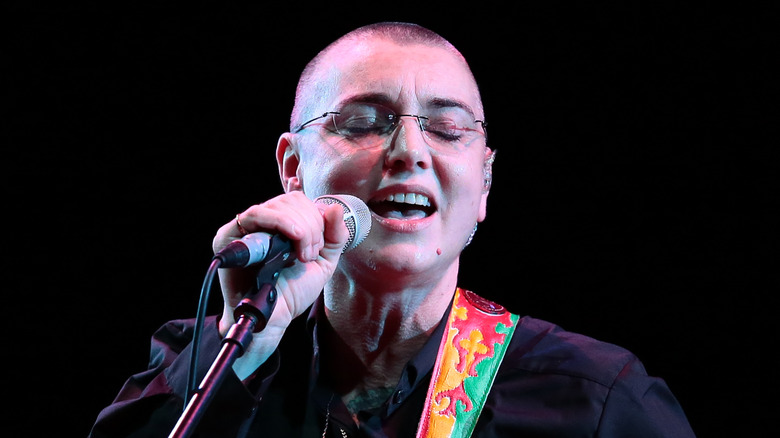Why Sinead O'Connor Called Her Pope-Ripping Protest On SNL 'A Blessing'
The death of singer Sinéad O'Connor of undisclosed causes at the age of 56 is an undeniable tragedy, and not one simply because of her relatively young age. During her time on this planet, O'Connor became a pop star, a symbol of feminist rebellion, and a pariah who had to walk through a media firestorm to come out the other side with grace and wisdom on her side.
The sight of her ripping up a picture of Pope John Paul II on "Saturday Night Live" has been seen as an indelible image of protest against the Catholic Church's sexual abuse cover-ups. It curtailed what looked like a limitless career. But the end result of the controversy was all right with O'Connor. She never intended to be a pop star and was fine with exiting the mainstream music picture.
What she dreamed of being was a protest singer. When "Nothing Compares 2 U" became a No. 1 pop hit and O'Connor earned worldwide fame and recognition, she was less than pleased by the ultimate result — she became a person she didn't want to be, a product of her record company. As such, she told The Today Show in 2021 that her actions proved to be a boon to her career, even if they were initially scandalous and appalling to many people. "It was a blessing because I had to make my living doing the thing I loved doing, which is making music live," she said. O'Connor also admitted that the photo of the pope belonged to her allegedly abusive mother.
Tearing the picture liberated her from the machinery of the music industry. Moreover, it got rid of that false Sinéad. "It was a way of ripping her up, as well, I guess," the singer admitted.
Sinead O'Connor always maintained that ripping up the Pope's picture was the right thing to do
Sinéad O'Connor delved even deeper and more frankly into her feelings about the "Saturday Night Live" incident during a 2021 interview with The Guardian in promotion of her memoir, "Rememberings."
When she was asked if the moment defined her entire career, she answered, "Yes, in a beautiful f***ing way. There was no doubt about who this b**** is. There was no more mistaking this woman for a pop star. But it was not derailing; people say, 'Oh, you f***ed up your career' but they're talking about the career they had in mind for me. I f***ed up the house in Antigua that the record company dudes wanted to buy. I f***ed up their career, not mine. It meant I had to make my living playing live, and I am born for live performance."
It's apparent that the experience was difficult for her, reclamation of self or not — she faced booing and castigating crowds at the live performances she wished to participate in, such as Bob Dylan's 30th-anniversary show. Churches literally steamrolled her records. While some friends like Kris Kristofferson stood by her, she was castigated by singers as varied as Frank Sinatra and Madonna. It got O'Connor banned for life from "Saturday Night Live," and it changed the commercial impact of her music forever. But it's the sort of rebellion that lit O'Connor's career up from the first, and what she will be remembered for in the future.
If you or someone you know may be the victim of child abuse, please contact the Childhelp National Child Abuse Hotline at 1-800-4-A-Child (1-800-422-4453) or contact their live chat services.

